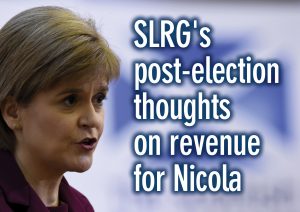The SNP manifesto came out just in time to read before the election. In it are the commitments to sustain and enhance the lives of citizens one expects to find — all competing for limited state revenue.
Is there any more the Scottish Government could do to enlarge the community chest without harming citizens and services?
A lot more!
The SLRG attempts to promote awareness of the importance of how revenue is collected. Sad to say, the way we do it today is ultimately responsible for the poverty and inequality that surrounds us.
Three of the four main UK parties are beginning to see this and included in their 2017 manifestos expression of intent to either enact or seriously consider enacting a ‘Land Value Tax’. The fourth manifesto, that of the SNP, was the only exception. The SNP would appear to be the last party to identify the way out of the fiscal stone age, in which Scotland is doomed to perpetual deficits.
A tax or a charge?
Land Value Tax is, unlike other taxes, benign. Which is why we use Adam Smith’s better description: Annual Ground Rent. It is a levy on site rental values that are provided by society or nature. A charge for the services associated with the location we each choose to monopolise by ownership.
The levy is the exact value of the services in each location because the amount to be collected is decided in a free market; not by the Government.
The Net Income of Scotland
It may come as a surprise, Nicola, that the Net Income of Scotland and the UK is not something your economic departments or HMRC are interested in! They have never sought to compute the taxable surplus of the country, the surplus wealth generated that could be collected without having to repress employment, incomes and enterprises by taxing them.
We refer to the unearned incomes currently pocketed by the owners of sites without any labour or effort: wealth that is generated by others but that is collected by them. Wealth that governments still choose not to tax because of the historical prevalence of such beneficiaries inside governments.
Encourage wealth creators or wealth extractors?
We would encourage you, Nicola, to observe how Scotland’s (and the UK’s) economy is occupied by two groups:
1. Wealth Creators
2. Wealth Extractors
In order to encourage the creation of wealth in Scotland, would the obvious goal not be, Nicola, to remove tax burdens from Group 1, who create the wealth?
Unfortunately, your current tax policy, Nicola, is to exclusively tax Group 1, the Wealth Creators, leaving Group 2, the Wealth Extractors with untaxed, unearned incomes composed of wealth created by the taxed productivity of Group 1.
This is, of course, a state of affairs you have inherited rather than invented Nicola. But because Group 2 has succeeded in organising a free ride for itself, we are as a consequence surrounded by poverty and inequality. In Scotland it is YOUR government, Nicola, that is sustaining the policy that causes our economic and social difficulties. Not to mention the starving of the public services which you state you wish to support in your manifesto.
It is Government that chooses
Can you see, Nicola, that the problem is one of Government choice and not some effect of uncontrollable ‘markets’?
On p 15 of your manifesto you state,
“We will back tax proposals that promote fairness, while raising the revenues required to protect the public services we rely on.”
Here is one we have been pointing out for nearly a year:
It is now nearly one year since you could have initiated the replacement of 10p of Income Tax with locally-collected AGR.
The effect would have been to start transfering the tax burden from repressed enterprises that produce wealth (losing at least £1 of economic activity for each £1 raised) to the recipients of unearned income extracted from society. Those unearned incomes are currently untaxed, Nicola. But collecting them would cause no economic distortion (Adam Smith).
THE NET EFFECT IS £BILLIONS FOR SCOTLAND, NICOLA.
Manifesto difficulties
Two illustrations from your manifesto illustrate the problem:
Page 21: “The Scottish Government is already lifting more than half of all premises out of business rates altogether.”
This sounds good. But what happens is this: the rents of half of all business premises rise immediately by the exact amount of the rates exemption, pouring public funds into the untaxed pockets of Group 2, Scotland’s Wealth Extractors.
Page 22: Infrastructure. You point out that £1.4bn has been invested in the Queensferry Crossing and £742m in the Glasgow–Edinburgh railway line.
As revealed following London’s Jubilee Line extension, such public expenditures are fantastic investments, providing four-fold returns over the sums invested. But who pockets the £billions under your tax regime, Nicola? Not society, who funded the projects, but untaxed Group 2, who own the benefiting sites whose rental values spiral.
Scottish society collecting what it creates — IS FAIR
Nicola, Annual Ground Rent allows Scottish society to collect the value IT creates — Scotland’s Net Income — without having to resort to measures that place wealth-creating Group 1 in its current tax straitjacket, dooming Scotland to perpetual deficits.
The AGR is different everywhere Nicola. Biggest in the most desirable locations for trade. Since 1707 the burgeoning sums sucked relentlessly from Scotland to London and the Southeast by the machinations of Group 2 are beyond reckoning. You can call a halt by getting under way with the collection of the Economic Rent we all generate collectively — for equal distribution — and free up Scotland’s wealth creators to start building the Scotland we all want. One in which life chances are equalised by AGR.
Note
For an unbiased discussion on the far-reaching positive consequences of collecting Economic Rent as revenue, please consult your retained Nobel Laureate Economic Adviser, Professor Joseph Stiglitz.
Ian Kirkwood
Scottish Land Revenue Group


